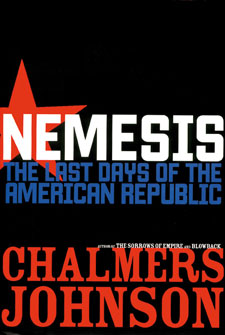In Blowback, the Californian academic Chalmers Johnson predicted that US foreign policy might draw terrorism to its own soil. The attacks of September 11, 2001, vindicated this fear.
Nemesis is the author's third work about the relationship between the United States and the world: here he argues that America's unavoidable choice is to forfeit either its empire or its democracy.
 Its "empire" is America's network of overseas military bases. Johnson tells us that at any one time (not counting Iraq), 200,000 American military personnel are stationed in 700 foreign military bases.
Its "empire" is America's network of overseas military bases. Johnson tells us that at any one time (not counting Iraq), 200,000 American military personnel are stationed in 700 foreign military bases.
The most significant bases were established in the 1940s, during the war against Nazism and Japanese Militarism. These were consolidated over the next fifty years during the struggle against Soviet communism.
By the fall of the Berlin Wall, America's foreign military presence was permanent. The US had acquired the self-appointed role of global policeman, and no longer required a particular threat to justify its global presence.
Why do Americans, often said to be uninterested in abroad, keep up this costly and unpopular deployment? They have been "bought", Johnson says " their politicians under the financial and electoral sway of the "military-industrial complex" whose influence President Eisenhower famously warned in his farewell address to Congress.
History proves, he says, that democracy and empire cannot co-exist. Just as the Roman Republic was overthrown by generals when its empire spread through the Mediterranean; the great North American republic too must one day cease to be either imperial or democratic.
While the Roman analogy seems to work, Johnson's claim that Great Britain gave up its empire in order to remain a democracy, is not equally as persuasive. Historians generally credit Britain's imperial "downsizing" to financial, rather than ethical, stress. History will remember that England and its dominions virtually invented modern democracy, from secret ballots and full manhood suffrage, to votes for women " all this during the reign of Queen Victoria, when her empire stretched the farthest.
Few would question that American principles of liberty and justice have been damaged by the detention of terror suspects at Guantanomo Bay, the degradations of Abu Ghraib, and the "rendition' of captured enemies into the hands of foreign torturers.
But Johnson's central claim " that Washington DC faces the serious risk of a military coup " seems to go too far. While soldiers enter US politics from time to time, many of them are "doves": General Wesley Clark campaigned for the presidency on the Democratic, not the Republican Party, ticket. General Colin Powell, as Secretary of State, was almost a lone voice opposing the invasion of Iraq.
Johnson compares the Bush administration to the Nazis. Well, Camp X-Ray may be a savage expediency, but it defies reason and mocks moral judgment to liken it to Auschwitz.
This book is written primarily for Americans: it invites them to question the price which America has paid " in lives, dollars, and its ideals " to honour President Kennedy's pledge, to "bear any burden, meet any hardship, support any friend, oppose any foe, in order to assure the survival and the success of liberty".
Nemesis was the Greek goddess of divine justice " or vengeance. Johnson sees America's attempt to remain a democracy as well as a world power as defying an iron law of nations.
Johnson otherwise touches little on religion " a curious omission in a book concerned with America's current military strategy; but consistent with his position that the issues which face the United States are timeless and not culture-specific.
"The nations are as a drop in the bucket", the prophet Isaiah said. The fading regimental banners in Anglican churches remind us that we Australians too once belonged to "an Empire on which the sun never set". Yet the sun set on the British Empire, as it had on Rome's.
While the Lord tarries, America's greatness too will surely fade. However unconvincing you may find Johnson's prognosis of America's future, his diagnosis of the problems which its foreign military deployment creates, is troubling but fair.



















